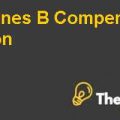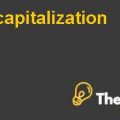
Problem Statement
The company’s corporate office had announced a profit goal of $500,000 to $1,000,000 for the Indonesian branch of the bank, which had put the Mehli Mistri, Country Corporate officer of the bank in trouble to make decision regarding the achievement of this goal in the recession phase of the Indonesian economy. He was confused about the fact that how he could accept such a high goal in such a tough economic conditions and he knew that he had already submitted a very aggressive budget, which included some growth in revenues and a slight drop in the profit for the year 1983. He was also facing a high staff turnover due to the economic downturn in the country and facing difficulties in retaining experienced staff members in the bank even after increasing the salary packages of the employees. He had also lost his Chief of staff and two other high ranked employees in the management positions, which had also made the situation worse, it was also difficult for the bank to further increase the salaries of the employees because the major concern of the bank was to compete over profitability. Being an international bank, the corporate officer was also facing difficulties from the government regarding the limitations of their jurisdiction of operations to the capital city, Jakarta only. So, it had made the competition and acceptance of such a huge profit goal more difficult with such a limited number of branches and geographical jurisdiction.
Strategic Alternatives
According to the information given in the case, it is very difficult to reach a clear decision because the case doesn’t provide detailed information about the fact that on what grounds Mr. Gibson had allocated $500,000 to $1,000,000 as the Indonesia’s share. It is also not clear that how the company’s profitability can be affected by the fluctuations in the exchange rates and the company’s capability to extend loans was also restricted to the corporations having headquarters in Jakarta. However, it has been given that the company had a parallel growth rate to that of the country’s growth rate figures, which is shown in the exhibit 4 of the case that the country’s GDP from 1968-1983 was grown at 7%, which means that the bank growth rate between 1968-1983 was also 7%. This shows that the company had followed an aggressive budget to keep its growth parallel to that of the country’s growth rate. Therefore, keeping in mind all these factors, Mr. Mehli Mistri should consider the following three alternatives before reaching to any sort of decision.
- Instead of taking any sort of decision regarding the future plans, Mr. Mehli Mistri should talk to Mr. Gibson and other executives of the corporate office of the bank about the difficulties in accepting the budget. He should make a comprehensive presentation to the management of the bank regarding the ongoing recession of the Indonesian economy and the problem of high employee turnover faced by the company. He should convince them about the Indonesian branch weak condition due to the lack of expert staff and middle line managers and also the restrictions imposed by the government of the country over its geographical span of operations. He should negotiate the matter in a constructive manner and instead of rejecting the budgeted goals of the company, he should ask them to reduce the profit goal to certain acceptable level and reallocate it over those countries and regions, where the economical and legal conditions are relatively better than the one existing in Indonesia. He should also assure them that he will try his best as he did in the past to exceed the allocated budget and try to reach the currently allocated level as well, but due to high economic and legal pressure prevailing in the region he is not going to make any sort of commitment.
- He should accept the increase in budget and focus upon the development of certain new consumer products for the market that will increase the revenues of the bank and also result in higher profit figures. By exercising this option, Mehli will shift his focus towards targeting the general public instead of offering lending facilities to the private corporations, whose headquarters are located in the Jakarta. This initiative will increase the chances of the revenue boost because due to the economic downturn in the country lending to the corporate sector is not a good option and on the other side these companies also get loans on very low interest rates, therefore, Mehli should target the masses of the Indonesian population by offering them lending and fixed deposit facilities.
- He should reduce the lending facilities for government and other public sector organizations because these organizations get loan at very low interest rates and also get it on some easy credit terms..............................
This is just a sample partial case solution. Please place the order on the website to order your own originally done case solution.













